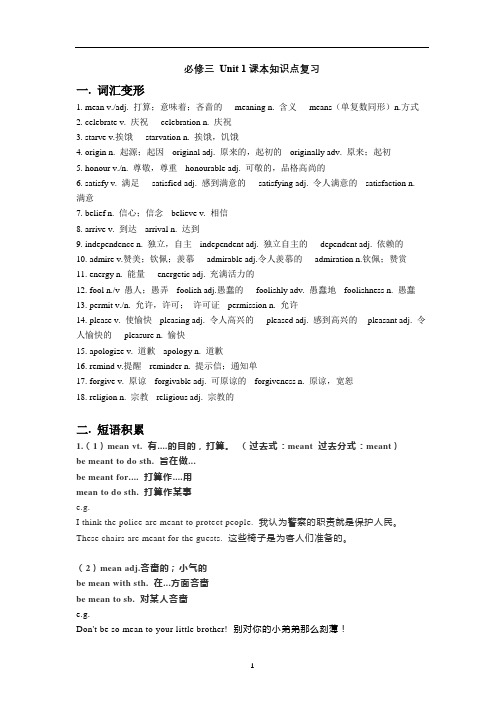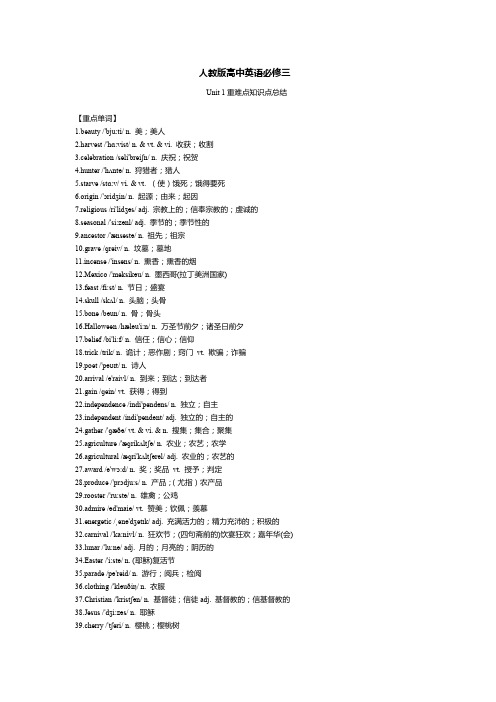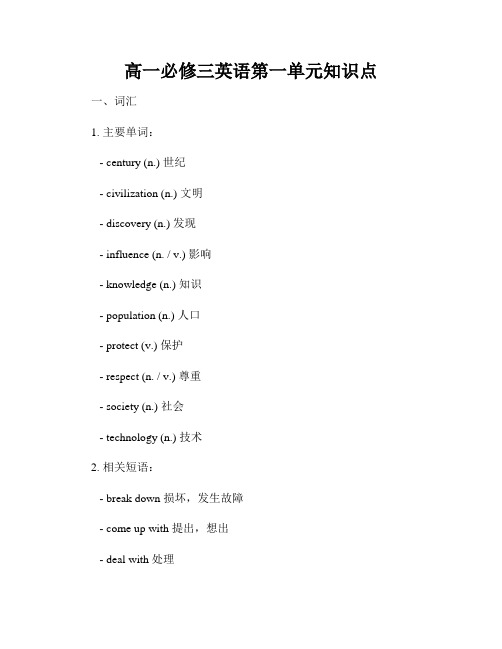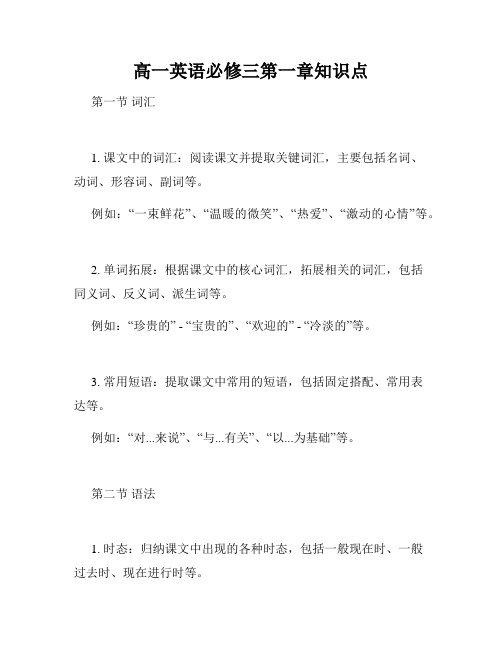高中英语必修三第一单元知识点总结.doc
人教高中英语必修三Unit1课本知识点复习

必修三Unit 1课本知识点复习一. 词汇变形1. mean v./adj. 打算;意味着;吝啬的-- meaning n. 含义-- means(单复数同形)n.方式2. celebrate v. 庆祝-- celebration n. 庆祝3. starve v.挨饿-- starvation n. 挨饿,饥饿4. origin n. 起源;起因-- original adj. 原来的,起初的-- originally adv. 原来;起初5. honour v./n. 尊敬,尊重-- honourable adj. 可敬的,品格高尚的6. satisfy v. 满足-- satisfied adj. 感到满意的-- satisfying adj. 令人满意的-- satisfaction n. 满意7. belief n. 信心;信念-- believe v. 相信8. arrive v. 到达-- arrival n. 达到9. independence n. 独立,自主-- independent adj. 独立自主的-- dependent adj. 依赖的10. admire v.赞美;钦佩;羡慕-- admirable adj.令人羡慕的-- admiration n.钦佩;赞赏11. energy n. 能量-- energetic adj. 充满活力的12. fool n./v 愚人;愚弄-- foolish adj.愚蠢的-- foolishly adv. 愚蠢地-- foolishness n. 愚蠢13. permit v./n. 允许,许可;许可证-- permission n. 允许14. please v. 使愉快-- pleasing adj. 令人高兴的-- pleased adj. 感到高兴的--pleasant adj. 令人愉快的-- pleasure n. 愉快15. apologize v. 道歉-- apology n. 道歉16. remind v.提醒-- reminder n. 提示信;通知单17. forgive v. 原谅-- forgivable adj. 可原谅的-- forgiveness n. 原谅,宽恕18. religion n. 宗教-- religious adj. 宗教的二. 短语积累1.(1)mean vt. 有....的目的,打算。
人教版高中英语必修三Unit 1 重难点知识点总结

人教版高中英语必修三Unit 1重难点知识点总结【重点单词】1.beauty /'bju:ti/ n. 美;美人2.harvest /'hɑ:vist/ n. & vt. & vi. 收获;收割3.celebration /seli'breiʃn/ n. 庆祝;祝贺4.hunter /'hʌntə/ n. 狩猎者;猎人5.starve /stɑ:v/ vi. & vt. (使)饿死;饿得要死6.origin /'ɔridʒin/ n. 起源;由来;起因7.religious /ri'lidʒəs/ adj. 宗教上的;信奉宗教的;虔诚的8.seasonal /'si:zənl/ adj. 季节的;季节性的9.ancestor /'ænsestə/ n. 祖先;祖宗10.grave /ɡreiv/ n. 坟墓;墓地11.incense /'insens/ n. 熏香;熏香的烟12.Mexico /'meksikəu/ n. 墨西哥(拉丁美洲国家)13.feast /fi:st/ n. 节日;盛宴14.skull /skʌl/ n. 头脑;头骨15.bone /bəun/ n. 骨;骨头16.Halloween /hæləu'i:n/ n. 万圣节前夕;诸圣日前夕17.belief /bi'li:f/ n. 信任;信心;信仰18.trick /trik/ n. 诡计;恶作剧;窍门vt. 欺骗;诈骗19.poet /'pəʊɪt/ n. 诗人20.arrival /ə'raivl/ n. 到来;到达;到达者21.gain /ɡein/ vt. 获得;得到22.independence /indi'pendəns/ n. 独立;自主23.independent /indi'pendənt/ adj. 独立的;自主的24.gather /'ɡæðə/ vt. & vi. & n. 搜集;集合;聚集25.agriculture /'æɡrikʌltʃə/ n. 农业;农艺;农学26.agricultural /æɡri'kʌltʃərəl/ adj. 农业的;农艺的27.award /ə'wɔ:d/ n. 奖;奖品vt. 授予;判定28.produce /'prɔdju:s/ n. 产品;(尤指)农产品29.rooster /'ru:stə/ n. 雄禽;公鸡30.admire /əd'maiə/ vt. 赞美;钦佩;羡慕31.energetic /ˌenə'dʒetɪk/ adj. 充满活力的;精力充沛的;积极的32.carnival /'ka:nivl/ n. 狂欢节;(四句斋前的)饮宴狂欢;嘉年华(会)33.lunar /'lu:nə/ adj. 月的;月亮的;阴历的34.Easter /'i:stə/ n. (耶稣)复活节35.parade /pə'reid/ n. 游行;阅兵;检阅36.clothing /'kləuðiŋ/ n. 衣服37.Christian /'kristʃən/ n. 基督徒;信徒adj. 基督教的;信基督教的38.Jesus /'dʒi:zəs/ n. 耶稣39.cherry /'tʃeri/ n. 樱桃;樱桃树40.blossom /'blɔsəm/ n. 花vi. 开花41.custom /'kʌstəm/ n. 习惯;风俗42.worldwide /'wə:ldwaid/ adj. 遍及全世界的;世界性的43.rosebud /'rəuzbʌd/ n. 玫瑰花蕾44.fool /fu:l/ n. 愚人;白痴;受骗者adj. 傻的vt. 愚弄;欺骗vi. 干傻事;开玩笑45.necessity /ni'sesəti/ n. 必要性;需要46.permission /pə'miʃn/ n. 许可;允许47.prediction /pri'dikʃn/ n. 预言;预报;预告48.fashion /'fæʃn/ n. 样子;方式;时尚49.parking /'pɑ:kiŋ/ n. (汽车等)停放50.apologize /ə'pɔlədʒaiz/ vi. 道歉;辩白51.drown /draun/ vt. & vi. 淹没;溺死;淹死52.sadness /'sædnis/ n. 悲哀;悲伤53.obvious /'ɔbviəs/ adj. 明显的;显而易见的54.wipe /waip/ vt. 擦;揩;擦去55.weave /wi:v/ vt. & vi. (wove/wəuv/,woven/'wəuvn/) 编织;(使)迂回前进56.herd /hə:d/ n. 牧群;兽群57.magpie /'mæɡpai/ n. 喜鹊58.weep /wi:p/ vi. (wept, wept) 哭泣;流泪n. 哭;哭泣59.announcer /ə'naunsə/ n. 广播员;告知者;报幕员60.remind /ri'maind/ vt. 提醒;使想起61.forgive /fə'ɡiv/ vt. (forgave /fə'ɡeiv/, forgiven /fə'ɡivn/ )原谅;饶恕【重点短语】1.mean doing sth. 意味着做某事2.mean to do sth. 打算或企图做某事3.be meant for 打算作……用4.take place 发生;举行5.of all kinds 各种各样的6.starve to death饿死7.be starved of 缺乏8.starve for ... / starve to do... 渴望……9.plenty of 大量; 充足10.be satisfied with对……感到满意11.to one’s satisfaction感到满意是12.in the shape of呈……的形状;以……形式13.in memory of sb./ to the memory of sb. 纪念某人14.dress up 穿衣服;打扮;化装15.award sth.(to sb.) 授予(某人)某物16.award sb. sth.(for ...) (因……)授予某人某物17.reward sb. for... 因……奖赏某人18.reward sb. with sth. 用某物酬劳某人19.admire sb. for... 因……钦佩某人20.look forward to期望,期待,盼望21.turn up 出现;把(收音机等)音量开大些22.turn down 拒绝;把(收音机等)音量开小些23.turn off 关掉24.turn on 打开25.turn out 结果是……26.turn to sb. for help 向某人求助27.keep one’s word 守信28.break one’s word 失信【重点句型】1.Please make sure when and where the accident took place.请查清楚事故是何时何地发生的。
高一必修三英语unit1单词知识点

高一必修三英语unit1单词知识点Unit 1 Word Knowledge in English for High School FreshmenIntroduction:In the first unit of the English curriculum for high school freshmen, various word knowledge points are introduced. This article aims to provide a comprehensive overview of the key vocabulary and their meanings, as well as their usage in different contexts. Let us delve deeper into the Unit 1 Word Knowledge.1. Nouns:Nouns are words that represent people, places, objects, or concepts. In Unit 1, we encounter several important nouns. For example:- Prototype: refers to an original model or form on which other things are copied or based.- Paradox: denotes a seemingly contradictory statement that may prove to be true upon further examination.2. Verbs:Verbs are action words that express an occurrence, process, or state. Unit 1 covers significant verbs, such as:- Assimilate: means to absorb and integrate information into one's understanding or knowledge.- Validate: implies confirming or establishing the truth, accuracy, or legitimacy of something.3. Adjectives:Adjectives describe or modify nouns, providing additional information about them. In this unit, we come across essential adjectives, including:- Profound: describes something with deep meaning, significance, or impact.- Elusive: portrays something or someone difficult to find, catch, or remember.4. Adverbs:Adverbs enhance the meaning of verbs, adjectives, or other adverbs by providing details about time, manner, place, or degree. Key adverbs in Unit 1 are:- Inevitably: denotes an action or event that cannot be avoided or prevented.- Explicitly: means expressing something clearly, without ambiguity or vagueness.5. Phrasal Verbs:Phrasal verbs are verb phrases comprised of a verb and one or more particles (prepositions or adverbs). In this unit, we encounter significant phrasal verbs, such as:- Set out: refers to starting a journey or task with a particular intention or goal.- Look up: means directing one's gaze upwards or searching for information in a reference source.6. Idioms:Idioms are phrases or expressions whose meanings may differ from the individual words used. Unit 1 introduces idioms that students should be familiar with, for instance:- Break the ice: signifies initiating a conversation or overcoming initial social awkwardness.- A piece of cake: denotes an easy or simple task.Conclusion:Developing a strong grasp of word knowledge is crucial for mastering any language. This article has highlighted key vocabulary in Unit 1 of the high school English curriculum, ranging from nouns and verbs to adjectives, adverbs, phrasal verbs, and idioms. By understanding these words and their usage, students can enhance their overall English proficiency. Keep exploring and practicing these word knowledge points to excel in your English studies!。
高一必修三英语第一单元知识点

高一必修三英语第一单元知识点一、词汇1. 主要单词:- century (n.) 世纪- civilization (n.) 文明- discovery (n.) 发现- influence (n. / v.) 影响- knowledge (n.) 知识- population (n.) 人口- protect (v.) 保护- respect (n. / v.) 尊重- society (n.) 社会- technology (n.) 技术2. 相关短语:- break down 损坏,发生故障- come up with 提出,想出- deal with 处理- find out 发现,查明- look forward to 期待- make up 编造,弥补- play a role 起作用- take part in 参加- turn to 求助于二、语法1. 一般现在时:表示客观事实、日常习惯等。
- 例句:The sun rises in the east.- 例句:I usually have breakfast at 7 am.2. 时间状语从句:使用when、while、before、after等引导的从句。
- 例句:I will call you after I finish my homework.- 例句:She always listens to music while she is doing homework.3. 直接引语和间接引语:将别人的话转述为间接引语时,需要注意时态和人称的变化。
- 直接引语:He said, "I am going to the park."间接引语:He said that he was going to the park.4. 及物动词和不及物动词:不及物动词后面不接宾语,而及物动词需要接宾语。
- 例句:He plays basketball very well. (及物动词)- 例句:She runs every morning. (不及物动词)三、阅读理解1. 主旨大意题:通过阅读全文,理解文章的主要观点或中心思想。
高一英语必修三知识点总结:Unit1

以下是⽆忧考为⼤家整理的关于《⾼⼀英语必修三知识点总结:Unit 1》,供⼤家学习参考! Unit 1 Festivals around the world 1. award sb. for… 某⼈因……⽽得奖 = sb. be awarded for…The school awarded Mary a prize for her good work. 学校因玛丽出⾊的⼯作⽽给她颁奖。
2. admire sb. for sth. 因为某事⼉钦佩(或羡慕)某⼈Everybody admires him for his fine sense of humor. ⼈⼈都钦佩他那绝妙的幽默感。
3. be meant to do sth. 被认为应做某事 (尤指根据职责或命令、吩咐等做某事)We are meant to write our names at the top of the paper. 我们应该把名字写在试卷的上⽅。
4. take place 发⽣ (⽆被动形式,常指经过安排的事情)The interview is well planned and it is to take place on time. 采访计划周密,会按时进⾏的。
5. in memory of… 为了纪念…… We sang the song in memory of the dead. 我们唱歌以纪念故去的⼈们。
6. dress up 穿上盛装;乔装打扮 She likes to dress up for a party. 她喜欢打扮得漂漂亮亮的去参加晚会。
be get dressed in… 穿着……的⾐服 7. The bride was dressed in white. 新娘穿⼀⾝⽩⾊的礼服。
8. look forward to + sth. doing sth. “盼望……” We look forward to the return of spring. 我们期待着春天的到来。
高一英语必修三第一章知识点

高一英语必修三第一章知识点第一节词汇1. 课文中的词汇:阅读课文并提取关键词汇,主要包括名词、动词、形容词、副词等。
例如:“一束鲜花”、“温暖的微笑”、“热爱”、“激动的心情”等。
2. 单词拓展:根据课文中的核心词汇,拓展相关的词汇,包括同义词、反义词、派生词等。
例如:“珍贵的” - “宝贵的”、“欢迎的” - “冷淡的”等。
3. 常用短语:提取课文中常用的短语,包括固定搭配、常用表达等。
例如:“对...来说”、“与...有关”、“以...为基础”等。
第二节语法1. 时态:归纳课文中出现的各种时态,包括一般现在时、一般过去时、现在进行时等。
例如:“I usually go to school by bus.”、“She wrote a letter to her friend yesterday.”等。
2. 语态:总结课文中的被动语态句型,理解主动语态和被动语态的转换规则。
例如:“The book was written by an American author.”、“Many trees have been planted in the park.”等。
3. 从句:分析课文中的主从复合句结构,包括定语从句、宾语从句、状语从句等。
例如:“The film that we watched last night was very interesting.”、“I believe that she will succeed.”等。
第三节阅读理解1. 主旨大意:归纳课文的主旨和总体内容,抓住文章的中心思想。
例如:“本课文主要讲述了环保和可持续发展的重要性,并鼓励大家参与其中。
”2. 细节信息:找出课文中的关键信息,包括人名、地名、时间、数字等。
例如:“The Green Earth Club was founded by a group of enthusiastic students in 2008.”3. 推理判断:根据课文的线索进行推理判断,分析作者的观点和意图。
高中英语必修三 unit 1 知识点
III---1 Festivals around the world一、知识点1.Festivals are meant to celebrate important times of year. 节日是用来庆祝一年的重要时光的。
mean doing sth. 意味着mean to do sth. 打算或企图做某事mean sb. to do sth. 打算让某人做某事be meant for 打算作……用;为…而有I believe he is meant to be a soldier.我相信他天生是要当军人的。
2. Discuss when they take place and what people do at that time. take place发生,举行take the place of代替,替代3. the beauty of the full moon 满月的美4. watch the full moon with family and friends和家人、朋友一起看满月5. Some festivals are held to honour the dead or to satisfy the ancestors, who might return either to help or to do harm. 有些节日,是为了纪念死者,或使祖先得到满足,因为祖先们有可能回到世上给人们提供帮助,也有可能带来危害。
to return to London 回到伦敦Return the book to the library. 把书归还给图书馆。
On my return from work, I saw the door was open. 我下班回家时,看见门开着。
6. …go to clean graves and light incense in memory of their ancestors…….去上坟、扫墓、烧香,以缅怀祖先。
人教高中英语必修三Unit1课本知识点复习
⼈教⾼中英语必修三Unit1课本知识点复习必修三Unit 1课本知识点复习⼀. 词汇变形1. mean v./adj. 打算;意味着;吝啬的-- meaning n. 含义-- means(单复数同形)n.⽅式2. celebrate v. 庆祝-- celebration n. 庆祝3. starve v.挨饿-- starvation n. 挨饿,饥饿4. origin n. 起源;起因-- original adj. 原来的,起初的-- originally adv. 原来;起初5. honour v./n. 尊敬,尊重-- honourable adj. 可敬的,品格⾼尚的6. satisfy v. 满⾜-- satisfied adj. 感到满意的-- satisfying adj. 令⼈满意的-- satisfaction n. 满意7. belief n. 信⼼;信念-- believe v. 相信8. arrive v. 到达-- arrival n. 达到9. independence n. 独⽴,⾃主-- independent adj. 独⽴⾃主的-- dependent adj. 依赖的10. admire v.赞美;钦佩;羡慕-- admirable adj.令⼈羡慕的-- admiration n.钦佩;赞赏11. energy n. 能量-- energetic adj. 充满活⼒的12. fool n./v 愚⼈;愚弄-- foolish adj.愚蠢的-- foolishly adv. 愚蠢地-- foolishness n. 愚蠢13. permit v./n. 允许,许可;许可证-- permission n. 允许14. please v. 使愉快-- pleasing adj. 令⼈⾼兴的-- pleased adj. 感到⾼兴的--pleasant adj. 令⼈愉快的-- pleasure n. 愉快15. apologize v. 道歉-- apology n. 道歉16. remind v.提醒-- reminder n. 提⽰信;通知单17. forgive v. 原谅-- forgivable adj. 可原谅的-- forgiveness n. 原谅,宽恕18. religion n. 宗教-- religious adj. 宗教的⼆. 短语积累1.(1)mean vt. 有....的⽬的,打算。
新外研版高中英语必修三Unit 1 知识点总结
(1)请随便夹你喜欢的东西吃。
Pleasewhat you like to eat.
(2)当她看到这个奇怪又有趣的人时,她禁不住笑了。
When she saw the strange and funny person, shelaughing.
Point4be crazy about
E.g I’mcrazy about basketball我对篮球很着迷…..
(3)with the help of.在…的帮助下
练习:
1.单句改错
She saw anadvertisementforvolunteers at her local gym and as she is interested in the whole area of dietand exercise she though she would help for.
13.concentrate on集中精力于;全神贯注于
14.loose lips sink ships祸从口出
15.be sure to一定;肯定
16.partly adv.部分地;在一定程度上
17.fault n.责任,过错
18.think before we speak三思而后行
19.apologise to道歉;认错;向某人道歉
Point3help out
E.g.......hope you can help me out!………希望你能帮我一把!
【用法详解】help out帮一把;帮助…解决困难/渡过难关
I willhelp out on my father's farm this summer.
今年夏天我要到父亲的农场去帮忙。
2020学年人教版高中英语必修三Unit1知识点归纳总结
2020学年人教版高中英语必修三Unit 1 Festivals around the word二、重点单词突破1 satisfy v.使满意,使满足;满足(需求、需要等)[应试指导]写作高分句式:What satisfied sb.is that...替换to one’s satisfaction他对赢得比赛感到满意。
[夯实基础](1)用satisfy的适当形式填空①None of these is particularly satisfying.②We are not satisfied with these results.③Both sides expressed satisfaction with the progress so far.④We just can’t find enough good second-hand cars to satisfy demands.⑤From his satisfied voice on the phone I know everything is going under way.(2)The teacher was satisfied with his test results and praised him.Satisfied with his test results,the teacher praised him.(用过去分词作状语改写句子)2dress v.给……穿衣;穿着;打扮;n.衣裙;女装;衣服[应试指导]过去分词作定语、状语的考查休穿戴整洁地上班去了。
The boys were all dressed up as pirates.这些男孩子都装扮成了海盗。
[词义辨析]wear,have on,dress,put on(1)wear和have on表示“穿着”的状态,wear同时表示“佩戴”,并可以用于进行时,后还可以跟表示颜色的名词,而have on不行。
- 1、下载文档前请自行甄别文档内容的完整性,平台不提供额外的编辑、内容补充、找答案等附加服务。
- 2、"仅部分预览"的文档,不可在线预览部分如存在完整性等问题,可反馈申请退款(可完整预览的文档不适用该条件!)。
- 3、如文档侵犯您的权益,请联系客服反馈,我们会尽快为您处理(人工客服工作时间:9:00-18:30)。
高中英语必修三第一单元知识点总结第一单元1)starve作不及物动词,表示“饿死,挨饿”。
starve for=be starve of/for,表示“渴望获得,迫切得到”。
2)plenty作不可数名词,只用于肯定句中,表示“充足,大量,富裕”,可做主语,宾语或表语。
做主语时,谓语动词随着plenty 所指的单复数形式作相应的变化。
plenty也可作副词,表示“充分地,十足地,好多”。
in plenty表示“大量的,丰富,充裕”可作表语,定语,状语。
3)satisfy作及物动词,表示“满意,使满足”,直接跟宾语,若接that从句时,意思是“使相信”,从句前有间接宾语。
satisfy…with以……满足be satisfied with对……满足satisfy…for向……偿还be satisfied to do sth满足于做某事4)harm作名词,意为“损害”,不与不定冠词连用,常与do,come,mean等动词搭配。
do more harm than good弊大于利there’s no harm in(sb’s)doing sth=it does no harm for sb to do sth做某事无害处作及物动词,表示“损害,伤害”。
5)lead作及物动词,表示“领导,引导”其宾语常接介词短语或者副词作宾补。
表示“影响,致使”时,后接介词to,也可以接不定式。
lead sb into使某人陷入某种不良的状态。
lead sb away使盲从,常用于被动语态。
lead nowhere 毫无结果,,对……不起作用。
lead up to sth作为……准备,导致。
lead sb by the nose牵着某人的鼻子,完全操纵某人leada dog’s life过困难的生活lead sb believe that使某人相信(假的事情或不确切的事情)lead the way带路,带头lead 作为名词,give sb a lead给某人做出榜样,提示某人6)origin 是名词,表示“起源,起因,出身”。
be of origin起源于,出身于7)event是名词,表示“事变,事件”,既可以指历史上的,国际上的,国内的大事件,也可以指日常事件,复数形式还可以指事态的发展和结局。
也可以指体育比赛中的“项目”。
常见词组:at all events/in every event总之,无论如何,不管怎样in the event结果,终于 in the event of万一,如果,倘若 in that event若果那样的话8)dress作及物动词,表示“给……穿衣”,后接人作宾语,也可以做不及物动词,表示“穿上衣服,穿着衣服”。
dress up穿上盛装,打扮dress作不可数名词,表示“衣服”;作可数名词,表示“妇女及儿童的衣服”。
dress sth up修饰,掩饰9)trickplay a trick on sb=play sb a trick开某人的玩笑,诈骗某人do/turn the trick 达到(预期的)目的,获得成功。
have a/the trick of doing sth (有)做……的习惯/癖好。
be up to tricks,be at one’s tricks 玩鬼把戏,闹恶作剧trick可以做动词,trick sb into doing 骗某人去做某事trick sb out of…骗取某人10)memory是名词,表示“记忆”时,接for而不接of。
复数形式memories可表示往事。
in memory of纪念,一般表示对死者的纪念。
lose one’s memory“失去记忆”,可能永远也想不起来;而slipsb’s memory指一般想不起来,可能不知道什么时候又想起。
within one’s memory=within the memory of表示“记忆所及的时间”。
11)gain作及物动词,表示“获得”,指经过努力取得有价值的东西或想要的东西。
34562019-10-09第一单元1)starve作不及物动词,表示“饿死,挨饿”。
starve for=be starve of/for,表示“渴望获得,迫切得到”。
2)plenty作不可数名词,只用于肯定句中,表示“充足,大量,富裕”,可做主语,宾语或表语。
做主语时,谓语动词随着plenty 所指的单复数形式作相应的变化。
plenty也可作副词,表示“充分地,十足地,好多”。
in plenty表示“大量的,丰富,充裕”可作表语,定语,状语。
3)satisfy作及物动词,表示“满意,使满足”,直接跟宾语,若接that从句时,意思是“使相信”,从句前有间接宾语。
satisfy…with以……满足be satisfied with对……满足satisfy…for向……偿还be satisfied to do sth满足于做某事4)harm作名词,意为“损害”,不与不定冠词连用,常与do,come,mean等动词搭配。
do more harm than good弊大于利there’s no harm in(sb’s)doing sth=it does no harm for sb to do sth做某事无害处作及物动词,表示“损害,伤害”。
5)lead作及物动词,表示“领导,引导”其宾语常接介词短语或者副词作宾补。
表示“影响,致使”时,后接介词to,也可以接不定式。
lead sb into使某人陷入某种不良的状态。
lead sb away使盲从,常用于被动语态。
lead nowhere 毫无结果,,对……不起作用。
lead up to sth作为……准备,导致。
lead sb by the nose牵着某人的鼻子,完全操纵某人lead a dog’s life过困难的生活lead sb believe that使某人相信(假的事情或不确切的事情)lead the way带路,带头lead 作为名词,give sb a lead给某人做出榜样,提示某人6)origin 是名词,表示“起源,起因,出身”。
be of origin起源于,出身于7)event是名词,表示“事变,事件”,既可以指历史上的,国际上的,国内的大事件,也可以指日常事件,复数形式还可以指事态的发展和结局。
也可以指体育比赛中的“项目”。
常见词组:at all events/in every event总之,无论如何,不管怎样in the event结果,终于 in the event of万一,如果,倘若 in that event若果那样的话8)dress作及物动词,表示“给……穿衣”,后接人作宾语,也可以做不及物动词,表示“穿上衣服,穿着衣服”。
dress up穿上盛装,打扮dress作不可数名词,表示“衣服”;作可数名词,表示“妇女及儿童的衣服”。
dress sth up修饰,掩饰9)trickplay a trick on sb=play sb a trick开某人的玩笑,诈骗某人do/turn the trick 达到(预期的)目的,获得成功。
have a/the trick of doing sth (有)做……的习惯/癖好。
be up to tricks,be at one’s tricks 玩鬼把戏,闹恶作剧trick可以做动词,trick sb into doing骗某人去做某事 t rick sb out of…骗取某人10)memory是名词,表示“记忆”时,接for而不接of。
复数形式memories可表示往事。
in memory of纪念,一般表示对死者的纪念。
lose one’s memory“失去记忆”,可能永远也想不起来;而slip sb’s memory指一般想不起来,可能不知道什么时候又想起。
within one’s memory=within the memory of表示“记忆所及的时间”。
11)gain作及物动词,表示“获得”,指经过努力取得有价值的东西或想要的东西。
34562019-10-09第一单元1)starve作不及物动词,表示“饿死,挨饿”。
starve for=be starve of/for,表示“渴望获得,迫切得到”。
2)plenty作不可数名词,只用于肯定句中,表示“充足,大量,富裕”,可做主语,宾语或表语。
做主语时,谓语动词随着plenty 所指的单复数形式作相应的变化。
plenty也可作副词,表示“充分地,十足地,好多”。
in plenty表示“大量的,丰富,充裕”可作表语,定语,状语。
3)satisfy作及物动词,表示“满意,使满足”,直接跟宾语,若接that从句时,意思是“使相信”,从句前有间接宾语。
satisfy…with以……满足be satisfied with对……满足satisfy…for向……偿还be satisfied to do sth满足于做某事4)harm作名词,意为“损害”,不与不定冠词连用,常与do,come,mean等动词搭配。
do more harm thangood弊大于利there’s no harm in(sb’s)doing sth=it does no harm for sb to do sth做某事无害处作及物动词,表示“损害,伤害”。
5)lead作及物动词,表示“领导,引导”其宾语常接介词短语或者副词作宾补。
表示“影响,致使”时,后接介词to,也可以接不定式。
lead sb into使某人陷入某种不良的状态。
lead sb away使盲从,常用于被动语态。
lead nowhere 毫无结果,,对……不起作用。
lead up to sth作为……准备,导致。
lead sb by the nose牵着某人的鼻子,完全操纵某人lead a dog’s life过困难的生活lead sb believe that使某人相信(假的事情或不确切的事情)lead the way带路,带头lead 作为名词,give sb a lead给某人做出榜样,提示某人6)origin 是名词,表示“起源,起因,出身”。
be of origin起源于,出身于7)event是名词,表示“事变,事件”,既可以指历史上的,国际上的,国内的大事件,也可以指日常事件,复数形式还可以指事态的发展和结局。
也可以指体育比赛中的“项目”。
常见词组:at all events/in every event总之,无论如何,不管怎样in the event结果,终于 in the event of万一,如果,倘若 in that event若果那样的话8)dress作及物动词,表示“给……穿衣”,后接人作宾语,也可以做不及物动词,表示“穿上衣服,穿着衣服”。
